|
|
|
Sort Order |
|
|
|
Items / Page
|
|
|
|
|
|
|
| Srl | Item |
| 1 |
ID:
116446
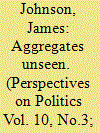

|
|
|
|
|
| Publication |
2012.
|
| Summary/Abstract |
Photography, understood as a technology for amplifying imagination, affords a useful tool for coming to terms with the massive forced migration caused by the Katrina catastrophe. Specifically, photographic projects by Robert Polidori and Richard Misrach reveal the exigencies of communicating in the wake of the disaster.
|
|
|
|
|
|
|
|
|
|
|
|
|
|
|
|
| 2 |
ID:
116448
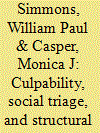

|
|
|
|
|
| Publication |
2012.
|
| Summary/Abstract |
Hurricane Katrina and its effects are often talked about in terms of what has been made visible, as if the hurricane swept through and stripped away our structural blinders along with the levees, revealing social disparities within. Here, we focus instead on whom and what Katrina and its aftermath have rendered invisible. We are concerned with how the seen and the not seen have influenced the ways the purported tabula rasa of New Orleans has been (re)constructed and marked since 2005. We engage with recent debates in political science about power, agency, structure, and culpability, arguing that efforts to prioritize the pursuit of culpability over critique in power analyses, such as the approach advocated by Steven Lukes, risk perpetuating structural violence. We employ the concepts of an ocular ethic and social triage to understand why the storm of the century that was supposed to reveal all has in the end left much concealed, with shocking levels of human devastation unaddressed. Only through careful excavation of the ruins can we begin to comprehend the sedimented inequality and layers of vulnerability that structure violence.
|
|
|
|
|
|
|
|
|
|
|
|
|
|
|
|
| 3 |
ID:
116442
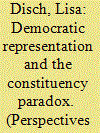

|
|
|
|
|
| Publication |
2012.
|
| Summary/Abstract |
That acts of democratic representation participate in creating the interests for which legislators and other officials purport merely to stand gives rise to the "constituency paradox." I elucidate this paradox through a critical reading of Hanna Pitkin's The Concept of Representation, together with her classic study of the philosopher Ludwig Wittgenstein, Wittgenstein and Justice. Pitkin's core insight into democratic representation is that democratic representation is "quasi-performative": an activity that mobilizes constituencies by the interests it claims in their name. I develop this insight together with its implications for contemporary scholarship on the political effects of economic equality. I conclude by arguing that the fundamental democratic deficiency of the US political system goes much deeper than its disproportionate responsiveness to wealthy interests; it is a matter of system biases that foster the formation and expression of those interests, while mitigating against mobilization by those Americans who want inequality to be reduced.
|
|
|
|
|
|
|
|
|
|
|
|
|
|
|
|
| 4 |
ID:
116444
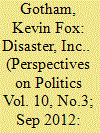

|
|
|
|
|
| Publication |
2012.
|
| Summary/Abstract |
This paper examines the problems and limitations of the privatization of federal and local disaster recovery policies and services following the Hurricane Katrina disaster. The paper discusses the significance of the Homeland Security Act of 2002 in accelerating efforts to devolve and privatize emergency management functions; the reorganization of the Federal Emergency Management Agency (FEMA) as a service purchaser and arranger; and the efforts by the New Orleans city government to contract out disaster recovery activities to private firms. I situate and explain these three developments in the context of recent trends toward the neoliberalization of state activities, including the privatization and devolution of policy implementation to private firms and non-governmental organizations. On both the federal and local levels, inadequate contract oversight and lack of cost controls provided opportunities for private contractors to siphon public resources and exploit government agencies to further their profiteering interests and accumulation agendas. This article demonstrates how the privatization of emergency management services and policy constitutes a new regulatory project in which the state's role has shifted away from providing aid to disaster victims and toward the management and coordination of services delivered by private contractors.
|
|
|
|
|
|
|
|
|
|
|
|
|
|
|
|
| 5 |
ID:
116449
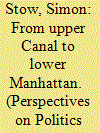

|
|
|
|
|
| Publication |
2012.
|
| Summary/Abstract |
The New Orleans Katrina Memorial is located at the upper end of Canal Street, an inexpensive and relatively short trolley car ride from the city's tourist hub in the French Quarter. Despite its ease of access, and close proximity to the more famous cemeteries to which tourists regularly make pilgrimage, the memorial is little visited and largely unknown, even to many of the city's own residents. In this it stands in stark contrast to the National September 11 Memorial in Lower Manhattan, which drew its millionth visitor less than four months after its opening on September 12, 2011. Recent work in political theory on memory, mourning, and memorialization-as well as Ancient Greek concerns about the same-point to the ways in which the manner of remembrance, grieving, and commemoration employed by a democratic polity help to shape political outcomes. In what follows, I trace the history and design of the New York City and New Orleans memorials to suggest the ways in which they embody and perpetuate national strategies of remembrance and forgetting, in which injustices perpetrated against the polity are prioritized over injustices perpetrated within it. Drawing on John Bodnar's distinction between national and vernacular commemoration, I nevertheless conclude with a counter-intuitive suggestion: that while on a national level the public's relative ignorance of the Katrina Memorial is indeed indicative of a polity more concerned with injustices perpetrated against it than within it; on a local level the erection and subsequent forgetting of the Katrina Memorial is a manifestation of a mode of vernacular memory, mourning and commemoration with far more democratically-productive potential than its counterpart in New York City. In particular, I argue that it cultivates, and historically has cultivated, a more forward-looking, progressive, and polyphonic response to loss than the type of dominant national narratives embodied by the 9/11 Memorial. Whereas the latter continually replays the loss in ways that rob the polity of its capacity to move beyond its initial response, the former acknowledges and incorporates the loss while steeling the community for the challenges ahead.
|
|
|
|
|
|
|
|
|
|
|
|
|
|
|
|
| 6 |
ID:
116440
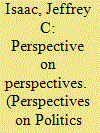

|
|
|
|
|
| Publication |
2012.
|
| Summary/Abstract |
The most important thing any scholarly journal can do is to publish scholarly research and writing that is both excellent and intellectually engaging. Since it hit the ground running in 2002, Perspectives on Politics has been committed to the highest standards of scholarly publication. At the same time, from its inception Perspectives has been a journal with a difference, seeking to combine scholarly excellence with relevance and readability, and to feature a wide range of formats for and perspectives on the serious study of politics. For the past ten years Perspectives has thus served as an important public sphere for political science in general and especially for the American Political Science Association.
|
|
|
|
|
|
|
|
|
|
|
|
|
|
|
|
| 7 |
ID:
116445


|
|
|
|
|
| Publication |
2012.
|
| Summary/Abstract |
Political scientists rightly reject the claim that demography is destiny; political institutions, practices, and choices intervene. Nevertheless, as demography changes, a locality's politics are likely to change as well, which opens opportunities for new research programs. Three demographic changes warrant new analyses: the decline of non-Hispanic whites in most large cities, the variety of non-Anglo groups and immigrants across cities, and regional variations in the racially-inflected dependency ratio. Each demographic change generates political and scholarly controversies: are cities becoming less segregated? Is black politics a useful template for studying the politics of other groups? Is the dependency ratio more likely to exacerbate or ameliorate group conflict? In lieu of answering these questions, I point to the odd normative valences of conservative and progressive scholarship, and urge attention to the ways in which cities can surprise us.
|
|
|
|
|
|
|
|
|
|
|
|
|
|
|
|
| 8 |
ID:
116447
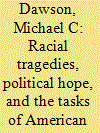

|
|
|
|
|
| Publication |
2012.
|
| Summary/Abstract |
The Trayvon Martin tragedy, the optimistic spectacle of the election and inauguration of Barack Obama during late 2008 and early 2009, and the aftermath of Hurricane Katrina seemingly represent three very different events with little in common except the claim made by some that all were in some way related to racial politics in the US. Many would consider such a claim weak, noting each event's unique scale and relationship to the politics of race in the US. Yet I argue that that the events are in fact closely linked in fundamental ways that are important not only to political scientists, but, more importantly, to all who care about the health of democracy within the US. Each event demonstrates the massive racial cleavages within the US. Each event illustrates the nature of evolving racial order in the US. Each event illustrates the weaknesses and problems that confront contemporary black politics. And each event thus illuminates key questions that should motivate theoretical and empirical work on race and politics within political science. In this essay, I highlight the themes and processes that tie together these seemingly disparate events, some marked by hope, others by despair. I start by analyzing each event from the standpoint of the persistent, if evolving, racial divide in American public opinion. And I end by arguing that scholars of race and politics often have to adhere to the most rigorous scholarly standards while also fulfilling their duties as citizens.
|
|
|
|
|
|
|
|
|
|
|
|
|
|
|
|
| 9 |
ID:
116443
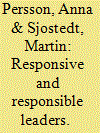

|
|
|
|
|
| Publication |
2012.
|
| Summary/Abstract |
Policy makers and policy-oriented scholars concerned with development and reform commonly appeal to "political will" as a cornerstone of development. We question the circular and voluntaristic view of leadership behavior inherent in such an approach, and argue that-to be more useful for the analysis of development outcomes, as well as for policy design-the discourse on political will should be firmly integrated into a more systematic framework of analysis. In particular, we suggest that it should engage in more active dialogue with the combined insights offered by principal-agent theory and what we refer to as state theory. More specifically, in the framework we develop, the principal-agent framework offers the analytical tools for analyzing leadership behavior at the micro level, while state theory provides crucial insights regarding the macro-level factors shaping leadership behavior. In the end, these two perspectives in tandem have the potential to significantly increase our understanding of empirically observed leadership behavior as well as our theoretical understanding of how the context-and especially the character of underlying social contracts-shapes and constrains "political will."
|
|
|
|
|
|
|
|
|
|
|
|
|
|
|
|
| 10 |
ID:
116441


|
|
|
|
|
| Publication |
2012.
|
| Summary/Abstract |
We propose a theory of political parties in which interest groups and activists are the key actors, and coalitions of groups develop common agendas and screen candidates for party nominations based on loyalty to their agendas. This theoretical stance contrasts with currently dominant theories, which view parties as controlled by election-minded politicians. The difference is normatively important because parties dominated by interest groups and activists are less responsive to voter preferences, even to the point of taking advantage of lapses in voter attention to politics. Our view is consistent with evidence from the formation of national parties in the 1790s, party position change on civil rights and abortion, patterns of polarization in Congress, policy design and nominations for state legislatures, Congress, and the presidency.
|
|
|
|
|
|
|
|
|
|
|
|
|
|
|
|
|
|
|
|
|